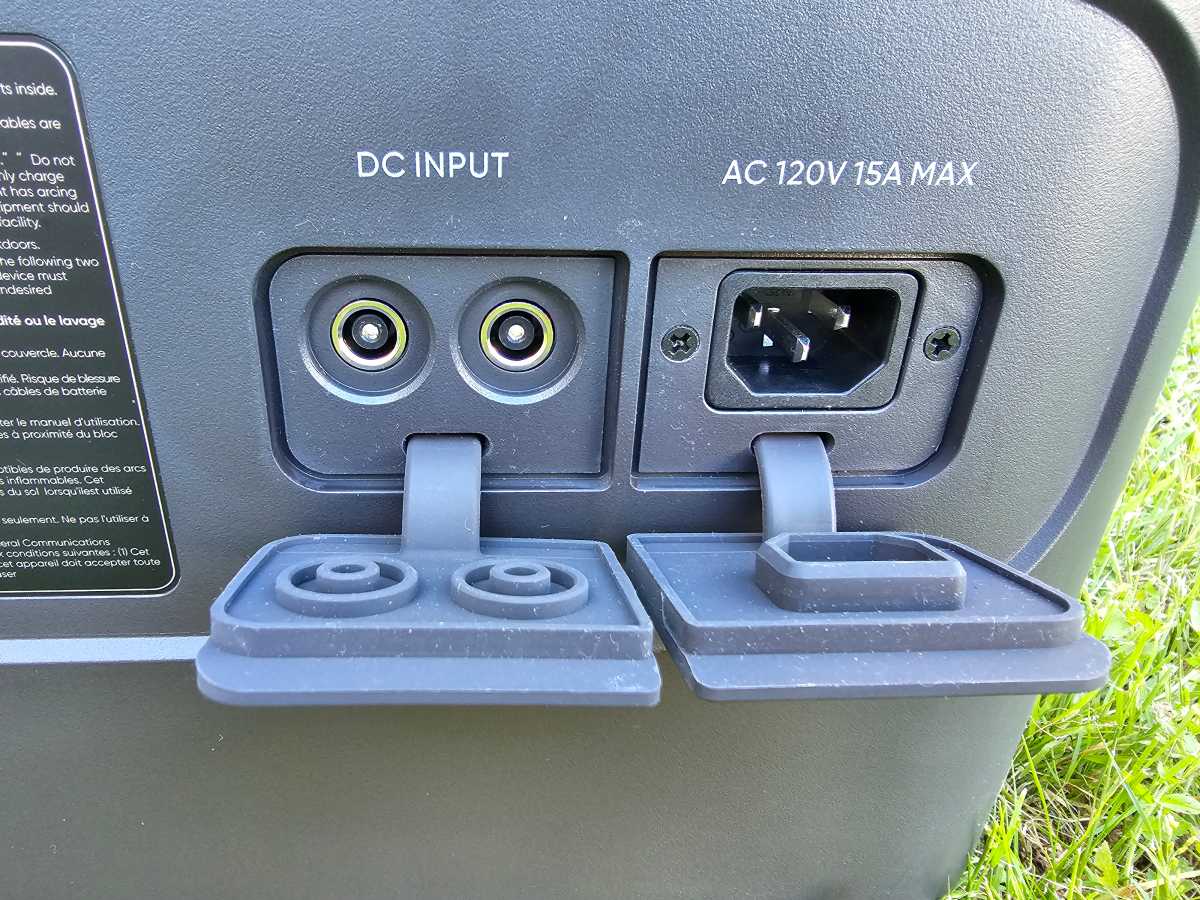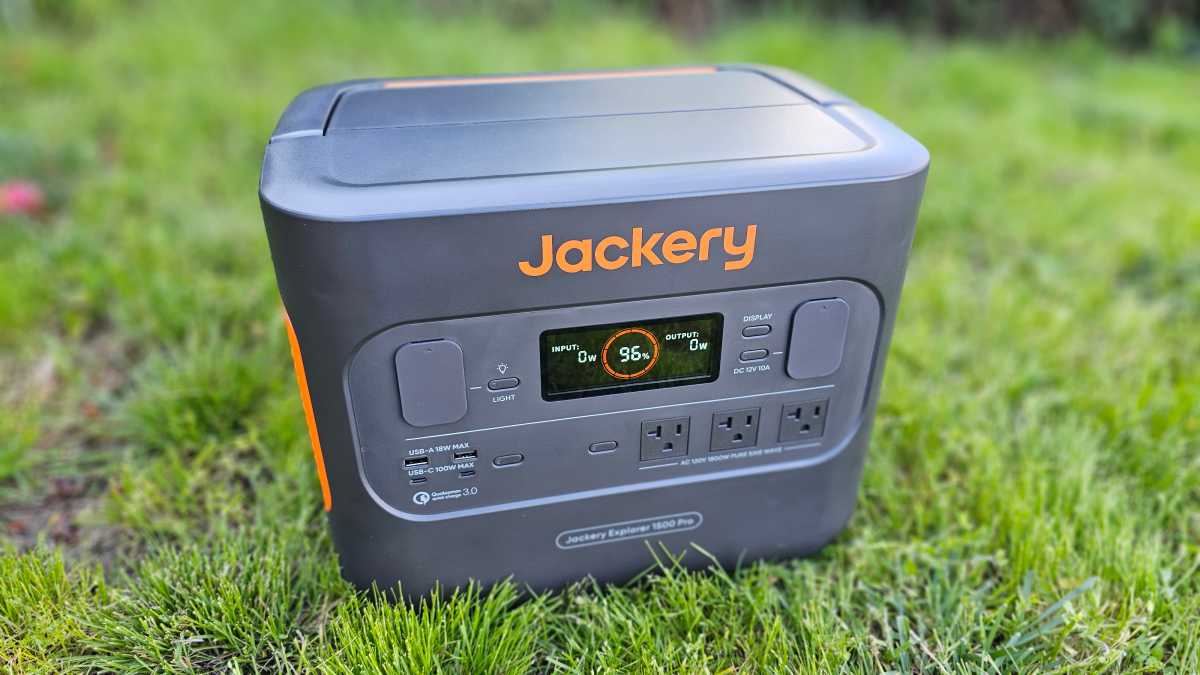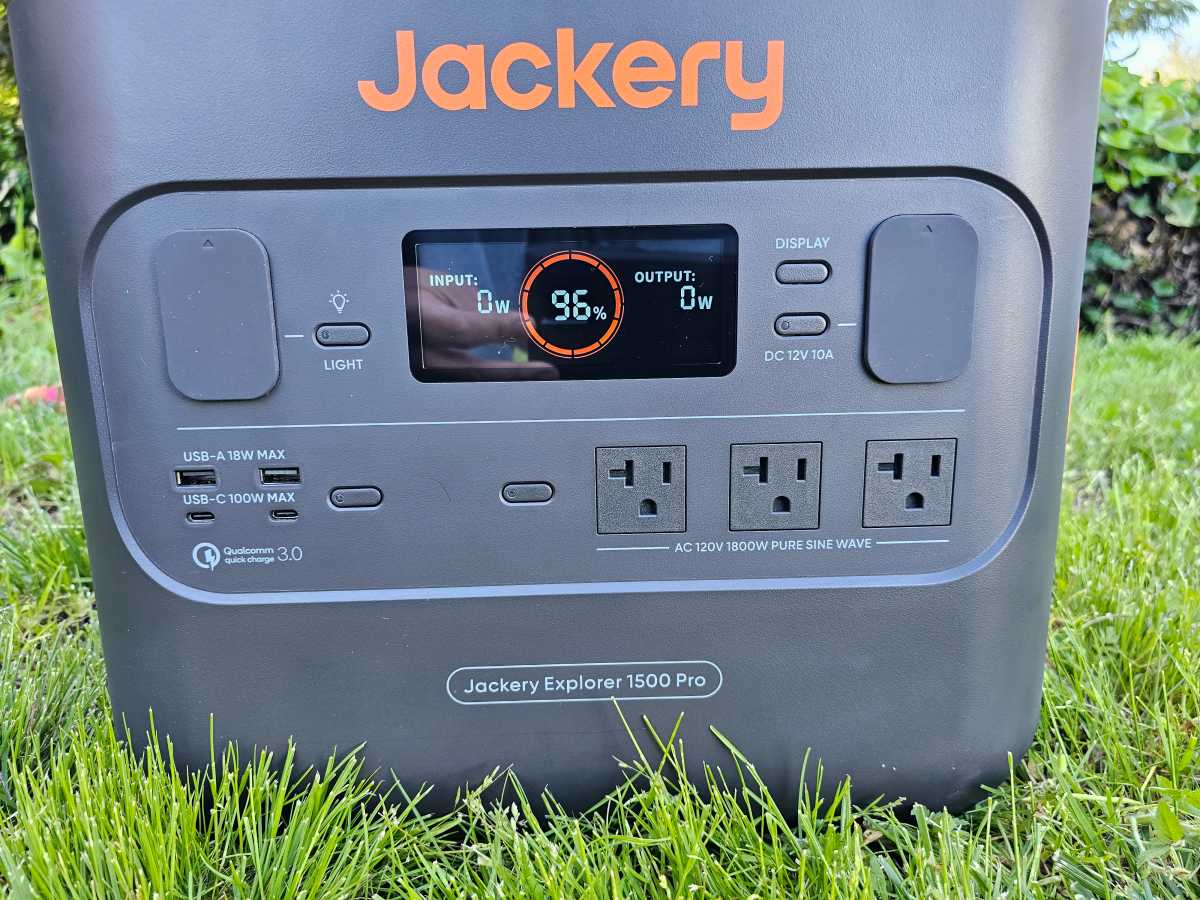Jackery Explorer 1500 Pro review: More performance per pound
What’s orange and black and can run your fridge, CPAP, or laptop for hours on end? Jackery’s Explorer 1500 Pro obviously.
With its trademark orange accents and folding cooler-style carry handle, the new Jackery Explorer 1500 Pro provides high capacity and high performance in a relatively light and compact body. We say relatively because, for its 1,500 watt hours, it’s actually pretty light at 37.5 pounds. Compare that to the competing Goal Zero Yeti 1500X, which despite having the same battery capacity, weighs about 8 pounds more than the Jackery.
Like the Goal Zero, the Jackery Explorer 1500 is probably the limit for what most people will want to carry to a campsite or up a flight of stairs while still offering a lot of power.
We know this from trying to move 3,000 watt-hour units on our own during a power outage. It’s difficult at best.
Further reading: See our roundup of the best portable power stations to learn about competing products.
 At a glance
At a glance
Expert’s Rating
Pros
- Good efficiency or “bang for you buck”
- Fast charging
- Relatively light for the capacity it packs
Cons
- No app support
- No ability to change charge rate
- LED light can be accidentally switched on
Our Verdict
The Jackery Explorer 1500 Pro packs in 1,500 watt-hours of performance while weighing a mere 37.5 pounds. That makes it the class leader in watt hours provided per pound.
Price When Reviewed
$1,699
Best Prices Today: Explorer 1500 Pro
What kind of ports does the Jackery Explorer 1500 Pro have?
For ports, the the Explorer 1500 Pro gives you three three-prong outlets keyed for 20 amps. Despite the 20 amp NEMA 5-2 keying of each outlet, each AC port is only rated for 1,800 watts continuous and 3,600 watts surge. For your phone, laptop, and tablet, the Explorer 1500 Pro gives you two USB-A ports and a pair of USB-C ports. The USB-A ports support Quick Charge 3.0 protocols for up to 18 watts for faster charging of older phones, while the USB-C ports support up to 100 watts over USB Power Delivery that will fast charge modern phones, tablets, and laptops.
Solar charging is done over a pair of DC-in/barrel chargers with up to an impressive 1,400 watts—if you can afford the solar panels to hit that rate. You also get a car cigarette power port providing 12 volts at 10 amps or 120 watts. Like most portable power stations, the “cigarette” port only supports 12 volts of output, which is fine for many accessories, but be mindful that certain devices built to run off a car’s 13 to 14.8 volts of output may not function. In that case, you’ll have to buy an AC power adapter with the right output and plug it into the normal AC plugs to make them work.

Gordon Mah Ung
What kind of battery does the Explorer 1500 Pro have?
The Explorer 1500 Pro is built using nickel manganese cobalt (NMC) lithium-ion batteries, which some will see as inferior to lithium iron phosphate (LFP) lithium-ion cells since the duty cycles are far lower on NMC cells. In Jackery’s defense, the company rates the battery at 1,000 full cycles before the battery capacity drops to 80-plus percent. LFP-fans will scream that 1,000 (which is still twice the 500 cycles of the Goal Zero Yeti 1500X) is poor compared to the typical 3,000-cycle range of LFP-based power stations.
We actually don’t think it’s that’s big a deal since most people using the unit for camping or in an emergency power outage will still see many years of service. However, if you are planning to run your power station full time in an off-the-grid scenario, you’ll probably want to opt for a battery using LFP batteries instead.
How does the Jackery Explorer 1500 Pro perform?
For efficiency tests, we use a 200-watt AC load, an 800-watt AC load and a 60-watt DC load. In all three areas, we saw the Explorer 1500 Pro perform quite well with 81 efficiency at 200W, a very good 83 percent at 800W, and an excellent 89 percent under the 60W DC load. Overall, that means you’re going to generally extract more out of the battery, which means you’re getting more of what you paid for. We should also mention that fan noise on the Jackery Explorer 1500 Pro was well managed except under the highest output or charge rates. Even then, fan noise was better than many competitors thanks to the larger fans which don’t have to rotate at the high RPMs of smaller fans (cough, we’re looking at you, EcoFlow).
The inverter is indeed a pure sine wave inverter according to our scopes but certainly not as clean a sine wave as the Goal Zero Yeti 1500X—although it worked just fine with our sensitive electronics.
Charging performance (which you can’t change) sees the unit pulling 1,500 watts from a wall socket and total charge time from empty to full in an impressive 107 minutes. That’s the kind of speed that means you can lug this station to work during an outage at your home, charge it up, and get back to powering your fridge without fear of anything defrosting.
The Jackery Explorer 1500 Pro had a total charge time from empty to full in an impressive 107 minutes.

Gordon Mah Ung
Jackery Explorer 1500 Pro application support
We’ve come to expect all new power stations to come with smart phone support to check the unit’s status over Bluetooth or Wi-Fi, but oddly, the Jackery Explorer 1500 Pro doesn’t offer it. This feels like a massive blind spot to us. It’s not that we’re so addicted to our smart phones that we just have to have an app; it’s that application support lets you do such things as customize the power station’s shut off time for the ports as well as easily update the unit’s firmware if needed. It’s also useful for monitoring the battery’s status remotely (assuming your internet is up and running). For example, during a power outage we experienced during a storm, we were able to remotely tell if the fridge was still getting power and could also tell if the power had come back on since we left the unit plugged into the outlet—that won’t happen with the Explorer 1500 Pro.
Why Jackery didn’t integrate app support is just bizarre, especially on such a powerful and full-featured power station. Is it possible app support could be added in the future? That’s hard to say but looking closely at the Explorer 1500 Pro’s screen, we could see a Bluetooth and Wi-Fi icon on it—there was just no way to turn on any such feature. We asked Jackery officials if we had somehow missed the option (we could find nothing in the manual either) but heard nothing back.
To be fair, as a power station, it makes no difference if there is app support or not—the only thing that matters is providing power.
What accessories come with the Jackery Explorer 1500 Pro?
Jackery provides an AC charging cable, car adapter for charging, and a pair of adapters to add solar panels to the unit. Normally we don’t need to mention this, but Jackery gets special credit for the included accessory bag with Jackery printed in orange on it. Most portable power stations don’t go to this effort but they should as not losing your cables is important. Perhaps more important is that the charging cable Jackery includes is a heavy-duty, heavy-gauge bright orange cable. This is critically important for power stations, which can push very high charge rates for more than an hour. That’s made us somewhat worried about people who mix up their cables and use a light-duty printer cable to charge at 1,400 watts for 1.5 hours. That can lead to problems if the cable overheats. With its accessory bag and bright orange cable, there’s no way you’ll do that with the Jackery Explorer 1500 Pro.
Is the Jackery Explorer 1500 Pro worth it?
For most consumers, the feature that the Jackery Explorer 1500 Pro will be judged on is its performance, and that’s where it excels. For example, with its 81 percent efficiency under a 200-watt load and its weight of 37.5 pounds, the unit produces almost 33 watt-hours per pound. The only unit we’ve seen exceed it is the Delta 2, but only when coupled with its auxiliary battery—by itself, the Delta 2 loses. It’s even worse for the similarly sized Yeti 1500X, which actually has slightly higher efficiency but due to its weight actually does worse than the Jackery Explorer 1500 Pro per-pound.
So, if you don’t mind the lack of smart phone support, and want the most power with the lowest weight, it’s going to be hard to beat the Jackery Explorer 1500 Pro.

Gordon Mah Ung
For all the latest Technology News Click Here
For the latest news and updates, follow us on Google News.
